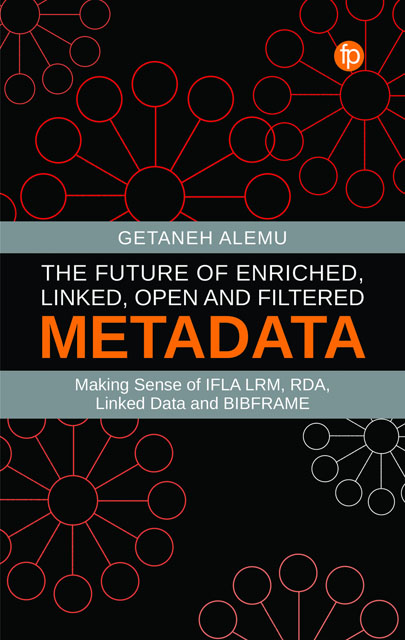 The Future of Enriched, Linked, Open and Filtered Metadata
The Future of Enriched, Linked, Open and Filtered Metadata Book contents
- Frontmatter
- Contents
- Figures
- Tables
- Code snippets
- About the Author
- Preface
- Acknowledgements
- Abbreviations
- 1 Introduction to Metadata
- 2 Metadata Strategies and Quality Indicators
- 3 Metadata Use Cases
- 4 Contemporary Metadata Principles
- 5 Enriched and Linked Metadata
- 6 Open Metadata
- 7 Filtered Metadata
- 8 FRBR, LRM and the Notion of Work
- 9 Resource Description and Access (RDA)
- 10 BIBFRAME: A New Metadata Framework
- 11 Crowdsourcing and User-Generated Metadata
- References
- Index
9 - Resource Description and Access (RDA)
Published online by Cambridge University Press: 18 November 2022
- Frontmatter
- Contents
- Figures
- Tables
- Code snippets
- About the Author
- Preface
- Acknowledgements
- Abbreviations
- 1 Introduction to Metadata
- 2 Metadata Strategies and Quality Indicators
- 3 Metadata Use Cases
- 4 Contemporary Metadata Principles
- 5 Enriched and Linked Metadata
- 6 Open Metadata
- 7 Filtered Metadata
- 8 FRBR, LRM and the Notion of Work
- 9 Resource Description and Access (RDA)
- 10 BIBFRAME: A New Metadata Framework
- 11 Crowdsourcing and User-Generated Metadata
- References
- Index
Summary
Overview
In this section, Resource Description and Access (RDA),the standard that replaced the Anglo-AmericanCataloguing Rules (AACR2), is defined and discussed.RDA is a cataloguing standard that includesinstructions for creating access points for printand digital information resources. This sectioncovers RDA entities, attributes and relationships,and links to other library standards such as LRM andBIBFRAME.
What is RDA?
The Resource Description and Access (RDA) is a set ofrecommendations on creating metadata for print andelectronic resources. It replaces AACR2 – which hasbeen around since the 1960s. AACR2 was a set ofrules, but RDA is simply a recommendation, not arule. AACR2 itself has a long history. AACR2, as thename also indicates, is criticised for being Anglo(English) and American. To address this, the JointSteering Committee for Development of RDA sought toinclude collaborators from across the globe, withthe aim of being inclusive. The name itself neededto change. So work began to draft a new standardwith a broad representation across various regionsand one that responds to the evolving needs – mainlyone that reflects the digital information landscape.Hence, RDA was born in 2010. However, change fromAACR2 to RDA happened at a slow pace. Many librariesstill use AACR2 and there are millions of legacyrecords with the old standard.
RDA aligns with and supports IFLA's conceptual models(frameworks), i.e. IFLA LRM. RDA is a cataloguer'sguide to creating metadata that supports FRBR users’tasks: find, identify, select, obtain and explore(Brenndorfer, 2016; El-Sherbini, 2013; Oliver,2010). Though RDA was published jointly by theAmerican Library Association, the CanadianFederation of Library Associations and the CILIP:Chartered Institute of Library and InformationProfessionals in the UK, its remit is internationaland places no linguistic or geographic limitations.As a result, the new standard is easily translatableto other languages and implementation contexts –this can be demonstrated by looking at the RDAToolkit (portal) and RDA Registry (a Linked Dataapplication). Old legacy library metadata is stillin AACR2. Many libraries do not necessarily changeolder records but create new ones using RDA.
- Type
- Chapter
- Information
- The Future of Enriched, Linked, Open and Filtered MetadataMaking Sense of IFLA LRM, RDA, Linked Data andBIBFRAME, pp. 197 - 212Publisher: FacetPrint publication year: 2022


